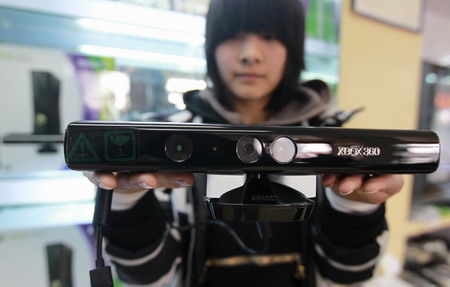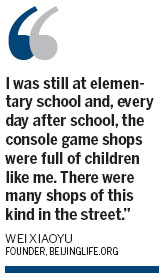Economy
Game shop owners playing for time
By Chen Limin (China Daily)
Updated: 2011-02-14 09:53
 |
Large Medium Small |
|
 |
|
A woman holds a Kinect console at a shop in Gulou Dongdajie in downtown Beijing, a 1,098-meter street frequented by console game enthusiasts who travel there to buy the latest on-screen craze from the many specialist shops. The road that leads up to the tourist site of the Drum and Bell towers is known as the capital's console game street. [Photo / China Daily] |
BEIJING - For more than 600 years, the ancient Drum and Bell towers due north of the Forbidden City informed Beijing residents of the time.
Although their roles as the official chronometer of China ended in 1924, when the last emperor of the Qing Dynasty (1644-1911) was driven out, the two huge edifices now preside over something far more up to date.
The neighboring Gulou area is frequented by console game enthusiasts who travel there to buy the latest on-screen craze from the many specialist shops in nearby streets - especially the 1,098-meter Gulou Dongdajie.
The road that leads up to the tourist site is known as the capital's console game street.
Before the 1990s, there were only a few shops scattered around the Gulou area that sold the games and associated hardware. But as their popularity rose, so did the number of customers and more shops began to spring up.

"Our shop opened at 9 o'clock and I usually found several people already waiting at the door," said the owner of Kamu Lewu, the oldest console shop in Gulou, who give his family name as Wang.
It was around the early 1990s when Nintendo Co Ltd's Family Computer, also known as Famicom, swept across the country, said Wang, who began to sell console games in Beijing in the late 1980s.
The computer, which sparked a two-decade era of Japanese console dominance, enjoyed similar success in China and sparked a nationwide console game craze.
|
||||
Wang recalled that a friend of his often stocked a truck full of goods every two or three days and sold them in his shop in Gulou and elsewhere in Beijing. That was around 1993, when the popularity of playing games using consoles was increasing exponentially.
"I was still at elementary school and, every day after school, the console game shops were full of children like me. There were many shops of this kind in the street," said Wei Xiaoyu, a 26-year-old founder of Beijinglife.org, a website that features articles about Gulou Dongdajie.
Wang said the peak for console game shops was between 1999 and 2000 when there were as many as 80 in the area.
Yin Yan, who is now in his 30s, is one of the many who entered the console game business in the 1990s.
"When I was a child, my dream was that my brother-in-law would open a console game shop but it ended up being me who did it," said Yin, who began his business 14 years ago.
Yin says the "golden age" of console games is over and business is getting harder and harder.
He said his shop in Gulou can earn a profit of about 200,000 yuan ($30,300) a year. It was much easier to generate good revenues seven or eight years ago than it is now. In the past, he could earn about 400 yuan by wholesaling a console, while now he earns only 50 to 100 yuan from a machine sold to customers.
"The competition is just too fierce," he said. "More people entered the industry and, in order to win more custom, some began to offer unreasonably low prices, which had a bad effect on business."
Counterfeit and low-quality products followed the price war, further exacerbating the situation.
| 分享按钮 |



